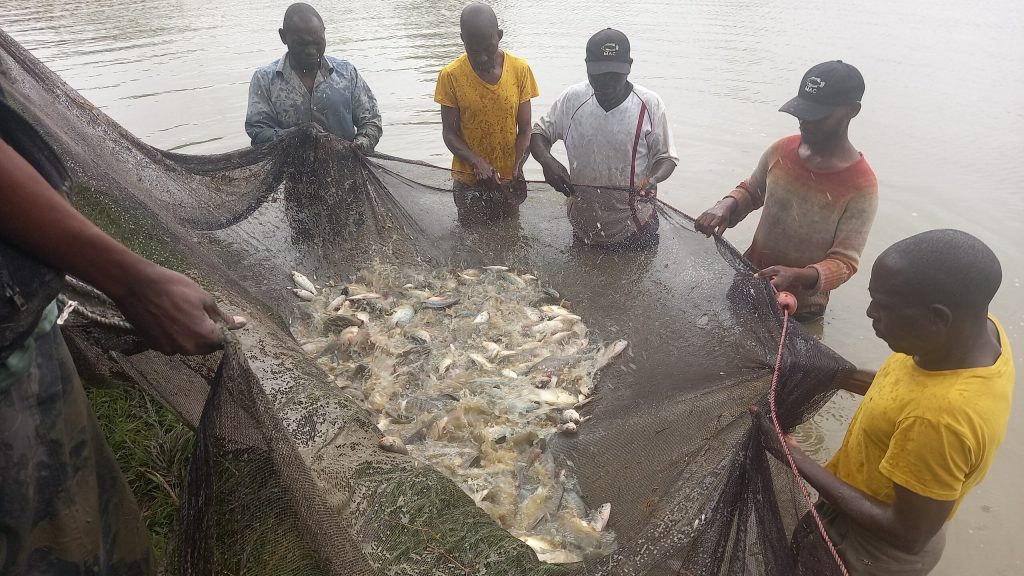You would not eat chicks why do you eat fingerlings, baby fish? If you eat baby fish, there will be no big fish. These juvenile fish would be worth much more if allowed to grow to full size.
According to fisheries experts, a hectare of fish pond, if well managed, can fetch up to K18 million worth of harvest.
A catch from Mzuzu pond
The fisheries sector plays an important role in food and nutrition security. Fish continues to be the main source of animal protein in the country. It contributes over 70 percent of the dietary animal protein intake for Malawians and 40 percent of the total protein supply.
The 2021 fisheries Sector Contribution Annual Economic Report shows that the fish landings had a beach or landed value of K183.840 billion with a volume of 170 844 metric tonnes. This is an increase of fish landing volume by 10 percent compared to 2019. In 2019, fish landings were worth MK169.56 billion, representing a volume of 154 923 metric tonnes.
However, in recent years, overfishing has led to reduced fish stocks. In an effort to increase the number of fish that they catch, fishers have been using longer nets with smaller mesh sizes, often made from malaria prevention mosquito nets. These nets catch fish at a very small size before they are fully grown and able to breed.
Many fish species, including two types of the popular and once commonly caught chambo (Oreochromis lidole and Oreochromis karongae) are now classified as endangered or vulnerable. The problem has been exacerbated by the lack of government funds to enforce fishing regulations.
Fingerings ready for relocation collected from the reserve site in Nkhata Bay
Still more, fish is Malawi’s most commonly eaten animal protein and the total weight of fish being caught has declined dramatically in recent years. This has serious nutritional implications for vulnerable groups such as pregnant and nursing women, young children and HIV and Aids sufferers.
The current situation is also unsustainable for the 60 000-plus fishers in Malawi. They rely on income from fishing for their livelihoods and are finding it harder to catch enough large fish to sell.
It also impacts the 500 000 other businesses that rely on fishing (fish processors, boat builders, net salesmen, etc.) and community businesses such as shopkeepers who depend on a thriving local fishing economy.
Ripple Africa’s Fish Conservation project is tackling this national problem by empowering local communities and officials to take control of the situation in their own areas.
The Fish for Tomorrow project is reversing the decline in fish stocks in Lake Malawi.
Ripple Africa country director, Force Ngwira, agrees overfishing is a huge problem in Malawi and one of the major challenges is the use of mosquito nets for fishing. These nets, he says, catch fish of all sizes, including fingerlings, drastically reducing the fish population.
“Under the project, we have built active involvement of communities in conservation—building partnerships between communities, parks and wildlife and fisheries. Formulation of local conservation by-laws for the national park in addition to district fishing by-laws and empowering communities to enforce these has been our formula in trying to restore the fish stocks in the lake,” he explains.
The organisation, according to Ngwira, started fish conservation in 2011 in Nkhata Bay and on building their experience of community-led forest conservation. They developed a simple approach where they trailed along a 40 km area of the lakeshore. It was so successful that communities wanted this approach and they are now working in five districts along the lake shore and protecting 450 km of the lakeshore.
Fanuel Banda, 56, from Traditional Authority (T/A) Fukamapiri in Nkhata Bay under Mayaya Beach Village Committee (BVC) is one of the people who have embraced the change and is benefiting from the project.
“I have a large family to support and not just one household. I have two wives and eight children. Despite the challenges this brings, I and my fellow fishermen have achieved a lot because of this project. I have been fishing for 22 years and have seen the decline in fish stocks in recent years. This is why I stopped using mosquito nets as advocated by Ripple,” he observes.
He says in 2017, he was only making approximately K60 000 per month but they are now protecting the fish breeding area so the fish breed and grow. They then swim back into the lake so I am catching bigger fish and making an average of K350 000 a month.
Banda revealed that he now uses the right fishing gears.
“I now use a 4½ inch net to catch large chambo fish. I have caught and sold enough big fish to start building a brick house for one of my wives. This year, I plan to save enough to build the second one. Life is so much better now. The money I earn from fishing is split with my wives Maria and Janet who run the household budgets, and I manage the rest,” he said.
Clement Chirwa from the same area is another beneficiary. He has been a fisherman for seven years and during that time, he has often struggled to come home with a decent catch.
In the past few years, his catch has improved enough so that he has been able to build his family a house with iron sheets, and pay for school uniforms for his four children.
He is used to catch catfish so he was not expecting to catch a Chimwi fish nor one so big.
With only a dug-out canoe, Chirwa will venture into Lake Malawi during the early evening to set the hooks, returning the next morning.
He said: “I was so excited when I saw the big fish. I usually only catch a few catfish, and sometimes I return empty handed.”
The Chimwi fish weighed 3.6kg and measured 63cm long.
“People in the village were shocked to see such a big fish again. Many had not seen this species of fish for more than 15 years and for some it was the first time to see this fish,” said Chirwa.
Not only are the fishermen beneficiaries of the project, the impact has spread to fish farmers staying very far from the beach. The fish conservation sites that the projects have initiated provide best fingerings to fish farmers that provide good harvest.
Speaking in an interview, Mzuzu aquaculture cost center manager David Mbamba said at first they were having difficulties securing fingerlings to be distributed to aquaculture farmers but with the initiative brought by Ripple Africa where bleeding sites are being cared for, they are no longer facing such challenges.
“We could travel to Zomba to secure fingerings but with the bleeding site established in Nkhata Bay by the project and managed by the BVC, this is an old story,” he said.
Mbamba said fingerings collected from the lake provide bigger earnings than those collected from another dam. The fingerings are distributed to 3 000 fish farmers the region has so far.
One of the fish farmers, Laness Kaunda from Group Village Kayinthaze in Mzimba North who receives fingerings from the reserve sites in Nkhata Bay initiated by Ripple Africa, confessed that fingerings from the reserve bleeding sites provide better harvest than recycled ones.
She said from the previous harvest, using fingerings from the reserve sites in Nkhata Bay, she managed to realize K10 million from a hectare pond.
Mzimba North fisheries research officer Innocent Thidza has since urged people to utilise vast tranches of wetland and dambos in the district to venture in fish farming which proved to be ideal in boosting their economic earning as crop production is facing decline due to poor soil fertility.
“Therefore, farmers have to embrace all forms of farming to remain food-secure and self-reliant,” he said.
Thidza bemoaned that most areas situated in the Viphya highlands under Bwengu are endowed with perennial rivers and good soils for fish ponds but remain under-utilized.
“Farmers have to embrace technical skills on how to construct ponds to raise fish,” he said.
Group Village Kayinthaze said he will encourage his subjects to take up fish farming.
“I will encourage my subjects to venture in fish farming because cattle farming is facing numerous challenges,” he said.
The national average beach price in 2021 as provided in the fisheries sector contribution annual economic report was at K1 076.07 per kilogramme of fish, which is an increase from K1054.46 per kilogramme in 2019.
In general, fish price according to fisheries department as of now is at K3 000 per kg.
The post Protecting juvenile fish, grow production appeared first on The Nation Online.
 Moni Malawi
Moni Malawi 

